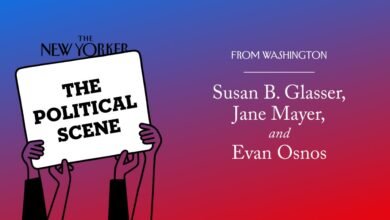David Wright Faladé on Pushing Against Easy Notions of Identity

This week’s story, “Amarillo Boulevard,” is about a woman named Jean, a rising senior at Spelman College, in Atlanta, who is back in her home town of Borger, Texas, where she’s introducing her fiancé to her friends and family. When did you start thinking about this character?
The genesis of the character goes back a few decades. Jean is based very loosely on my big sister, Myriam. We’re only seventeen months apart and have always been very close, but in the way that family members often are—maybe especially when of different genders. You feel profound connection and, at the same time, also can’t quite—or can’t fully—understand what motivates the other person to do what they do. In creating Jean, I was thinking about Myriam and how she has become who she is.
Early on, we learn that Jean’s fiancé, a Nigerian American medical student named Wole, has recently cheated on her. It was a one-time thing, he said, occurring at a time of high stress, and they’re currently seeing a counsellor in Atlanta. How much has this unsettled Jean? Is she looking at all aspects of her life anew?
Jean is at this point in her life when she’s beginning to see everything with new eyes. Wole’s infidelity is an important inciting incident, but this moment of personal reckoning was inevitable. She left home for college understanding herself to be a certain person, to a large degree because of the expectations that have been placed upon her—as a young woman of a certain caste (what used to be called the Black Bourgeoisie). She’s always striven in the ways that were expected of her. Then the “real world” intercedes and forces her to scrutinize the ledger, to see if what’s expected of her is who she actually wants to be.
Jean, Wole, and her younger brother, Sylvester, drive together to Amarillo for something to do. On Amarillo Boulevard, Jean catches sight of an old childhood friend from Atlanta, Nia, among a group of sex workers. How shocking is this for Jean?
Even more than Wole’s infidelity, seeing Nia on Amarillo Boulevard forces Jean to do this personal reappraisal. Because on some level, she has to ask herself, “Why Nia and not me?”
Part of the answer to this question is obvious: privilege. She’s been blessed with being from a stable family with plentiful finances. Those things sheltered Jean during her coming up and helped her to thrive. But Jean has this profound apprehension that something else may have been at play. Maybe it was just dumb luck more than anything that she or her parents or her community did to help her achieve what she has. How can she take credit for dumb luck? Or even feel assured that her good fortune will continue?
Jean is, as her mother was before her, a Mu Pi soror at Spelman. How important is that identity to her? In Borger, her closest friend from high school is white. What’s more complicated for her to negotiate, differences in race or class or one’s future expectations?
James Baldwin—in an essay or maybe in one of his printed conversations or interviews, I don’t remember which—described being white in America as the effort to not be Black. That struck me upon first reading it, not merely for the truth of the statement but also for its broader implication. Americanness, as an identity, it seems to me, too often revolves around othering. We Americans tend to want to assert who we are as a people in contradistinction to who we imagine—oftentimes quite superficially and quite shallowly—other groups to be. That strikes me as a bad, and maybe also a dangerous, way of understanding ourselves in the world, particularly if we cling too tightly to our superficial imaginings of the other.
So, in my writing, I find myself trying to collapse borders by trying to cram as much difference as I can into a tight space. In “Amarillo Boulevard,” I wanted to push against easy notions of what it means to be Black or white or brown, of what it means to be a woman or a man, as a way to explore just how porous and artificial—and, ultimately, limiting—those walls truly are.
We ran an excerpt from your 2022 novel, “Black Cloud Rising,” which was set during the Civil War. Earlier this year, you published your latest novel, “The New Internationals,” which is set in Paris in 1947. It’s inspired by your own family history. Does writing historical fiction come with any challenges? And did fiction free you to think imaginatively about your origin story?
Yes, definitely. “The New Internationals” is a good case in point.
The novel tells the story of a love triangle in postwar Paris between a Holocaust survivor, an African student from colonial West Africa, and a Black G.I., and I was really struggling with the main character, Cecile, the Holocaust survivor, who is loosely based upon my mom. I was a 2021-22 fellow at the Cullman Center at the New York Public Library. We fellows had to give a presentation on our works in progress, and afterward we’d gather on the red couches in the center and have these really stimulating, really illuminating conversations. Having already worked for more than a decade on the book, I was prepared to abandon Cecile as a point-of-view character and just feature the two male P.O.V.s, with Cecile as a sort of protean character whom the reader comes to understand by how these two men see her. I explained this to the other fellows, and the general response was, “No! Don’t do that,” particularly from the women in our group.






